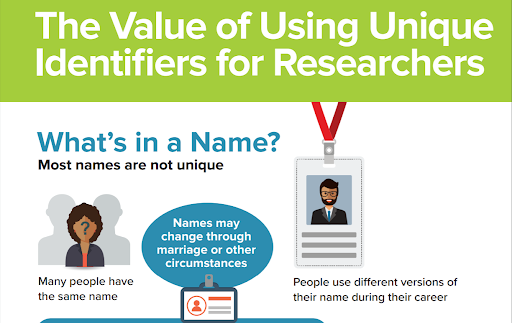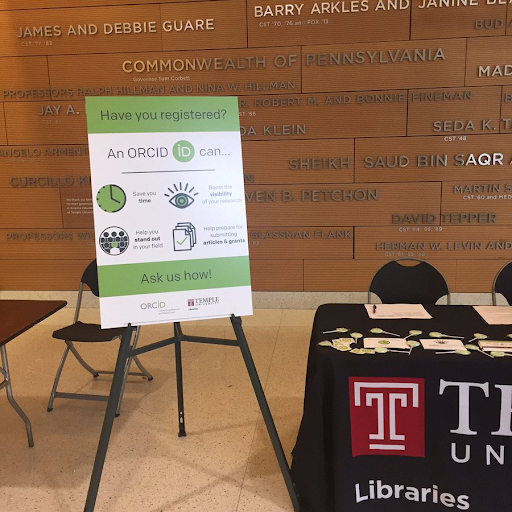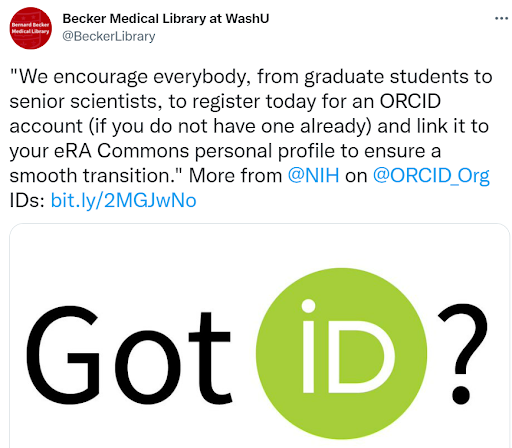Several ORCID US Community member organizations have expressed interest in using ORCID to help with graduate student success and assessment. This blog summarizes many of the considerations for promoting and using ORCID for grad students, including a case study from Indiana University Bloomington, where Willa Tavernier, Research Impact and Open Scholarship Librarian, has been leading ORCID adoption efforts. Willa shared her experience at the May 2022 ORCID US Community call on the topic of “ORCID for Grad Students,” on which this blog is based. Many thanks to Willa for sharing her insight!
Benefits of ORCID for Grad Students
The benefits of ORCID for grad students are essentially the same as the benefits of ORCID for all researchers: Unique ORCID iDs can help to distinguish students from other researchers regardless of shared names or name changes, and the ORCID record can serve as a central, prominent location to store and display a student’s organizational affiliations and research activities, helping to build their digital identity as they move through their education and into their professional career.

An ORCID infographic explains “The Value of Using Unique Identifiers for Researchers: Most names are not unique. Many people have the same name. Names may change through marriage or other circumstances. People use different versions of their name during their career.” Source: https://drive.google.com/file/d/1NWYh5qR4Ts0wdYPi9bmfHYvMp8HMi8XL/view?usp=sharing
As with all researchers who may be applying for grants and publishing their work, grad students can use their ORCID iD and ORCID record to meet funder and publisher requirements and in some cases save time by importing disclosure information from ORCID into systems that are integrated with the ORCID API. For example, when creating a biographical sketch using SciENcv for National Science Foundation (NSF) or National Institutes of Health (NIH) grant applications, researchers can choose to import data from their ORCID record by clicking a button rather than manually filling out the required forms. As more Federal funders increasingly ask for or require ORCID iDs from researchers, as indicated in the National Security Presidential Memorandum 33 (NSPM-33), ORCID could become increasingly beneficial for researchers.
Students that are publishing or thinking about publishing in scholarly journals are more likely to create, use, and benefit from ORCID, due to journals requiring ORCID iDs. Since most publishers assign DOIs to journal articles, those published works can be automatically added to ORCID records via the Crossref and/or DataCite search and link wizards, as long as the author’s ORCID iD is present in the article DOI metadata.
Similarly, many national laboratories and user facilities also ask for or require an ORCID iD from researchers, and will subsequently write research resources usage information to ORCID records. So far, students in the STEM disciplines are more likely to encounter ORCID than those in arts, humanities, and social sciences, due to ORCID requirements and ORCID enabled-systems being used more in STEM disciplines, but awareness and uptake of ORCID is slowly but surely spreading to multiple other research areas.
Grad students can benefit from ORCID even more when their universities actively use ORCID in grad student related workflows. For example, when grad students submit their Electronic Thesis or Dissertation (ETD), their ORCID iD can be collected (via the ORCID API) and associated with their ETD in an institutional repository and/or DOI metadata (if your organization assigns DOIs to ETDs). In turn, the ORCID member API can be used to write ETDs and other works information to grad students’ ORCID records. Additionally, if grad students are publishing in any open access journals published via Open Journal Systems (OJS), the ORCID Plugin for OJS can be used to collect and display their ORCID iDs, and write these publications to ORCID. The ORCID Affiliation Manager can be used to write grad student education affiliation details to ORCID, and a number of vendor systems or custom applications can be configured to write research information to ORCID records. By writing this kind of information to grad students’ ORCID records, institutions can help grad students to establish a digital presence and prepare to save time when applying for grants, publishing, and reporting on their research activities in the future.
Organizations can also pull information out of grad students’ ORCID records. As long as grad students have continued to keep their ORCID records up to date, information from ORCID can be used to help with reporting, assessment, and keeping up with alumni after graduation to get an idea of programmatic impact and what students have gone on to do after leaving the institution.

Temple University uses a custom-made ORCID outreach poster to draw attention to a promotional ORCID table. Source: https://twitter.com/anniekjohn/status/1070312050059042817
Promoting ORCID to Graduate Students
Outreach and education is crucial for promoting adoption of ORCID to all researchers, including grad students. One unique challenge for grad student adoption of ORCID is that if they are not publishing their work or applying for grants yet, they may not immediately recognize how ORCID can benefit them. It’s never too soon to get started with ORCID as a way to build scholarly identity. There are a number of different strategies that can be used to help grad students understand the basics of what ORCID is and how it could potentially benefit them now or in the future. Check out our ORCID US Community Outreach Planning Guide for ideas about how to promote ORCID to researchers at your organization. Some initial ideas for reaching grad students specifically include:
- Graduate Student Orientation - share info and encourage ORCID iD registration
- Workshops & Trainings - include information about ORCID in all events related to research lifecycle, scholarly identity, research impact, etc.
- Consultations - provide 1:1 help for setting up ORCID record
- Tabling - give out ORCID swag and encourage students to get their ORCID iD
- Social Media - share info about ORCID on Twitter, Instagram, Facebook, etc.
- Poster Templates - provide ORCID QR codes for poster presentations
- Email Signature Templates - include ORCID iD link
- Matching Students with Mentors - use ORCID records to help students find faculty mentors with similar research interests (see example from the University of British Columbia graduate school - case study presentation starts at 14:50)
- Leveraging the ORCID API:
-
- ORCID Affiliation Manager - write education affiliations to students’ ORCID records (see example from Univ. of Georgia)
- Open Access Student Publishing - use the ORCID plugin for OJS in journals that have student contributors
- ETD Submission - use the ORCID API to collect author ORCID iDs to include along with author names in ETD metadata (repository platforms such as Esploro and DSpace have ORCID API integrations already available)
- Other Local Systems - allow students to import/export data between campus systems and their ORCID record to show the benefits of data interoperability that ORCID provides. See our list of common systems for details about what systems can be integrated with ORCID, and/or think about building a custom integration.

A tweet from Becker Medical Library at Washington University in St. Louis promotes ORCID to “everybody, from graduate students to senior scientists…” Source: https://twitter.com/BeckerLibrary/status/1158398701959811072?s=20
Insight from Indiana University Bloomington
Indiana University Bloomington (IUB) became an ORCID member through the ORCID US Community in August 2018. Research Impact and Open Scholarship Librarian, Willa Tavernier, was tasked with determining a plan for how to get the most from the institutional ORCID membership. To get started, she attended all of the ORCID US Community calls and showcase webinars to learn what other member organizations were doing, and used ORCID’s outreach resources to do some initial tabling at campus events, including graduate student orientation and new faculty orientation. The member reports provided by ORCID were helpful in getting an idea of current ORCID adoption and where outreach efforts would be most needed. Willa also initiated conversations with other stakeholders on campus about implementing the ORCID member API in local systems, and she was able to get insight from other ORCID member organizations that were using similar system integrations.
IUB was already using Faculty Success (formerly known as Digital Measures) as a research information management system for faculty, as well as Open Journal System (OJS) for Open Access journal publishing. Both of these systems have ORCID API integrations built-in, so IUB activated those integrations. Willa created an ORCID LibGuide, and started promoting the ORCID API integrations available on campus. In addition to promoting ORCID to faculty, Willa also immediately identified the need to promote ORCID to graduate students to not only benefit the students as individuals, but also to bolster the research and scholarly communication ecosystem as a whole. After reading an article on Academic Libraries and Technology: An Environmental Scan Towards Future Possibility, it became clear that persistent identifiers (PIDs) such as ORCID (for individuals), DOIs (for objects/outputs), and ROR IDs (for research organizations), make it easier to see connections between these entities and make research and scholarship more FAIR (Findable, Accessible, Interoperable, and Reusable). Grad students are part of the wider research ecosystem, and thus should be included in the PID landscape.
To encourage use of ORCID iDs amongst grad students at IUB, Willa began promoting ORCID along with the library’s other scholarly communication services at graduate student orientations, grad student symposiums, digital humanities program events, and workshops at the grad student mentoring center, as well as various events for specific units on campus such as the Center of Excellence for Women in Technology. Informational handouts were made available in multiple different languages, and students were able to sign up for individual consultations to get help with populating their ORCID records and understanding how they could use ORCID in their work.
Through these outreach efforts, over 100 grad students registered for an ORCID iD, some of whom came in for consultations to better understand how to use ORCID. For example, one student from the School of Education was able to successfully connect her ORCID iD with an article that she published via one of IUB’s open access journals, using the ORCID plugin for OJS. Not only was she able to have her ORCID iD displayed next to her name on the publication, but the article was also automatically added to the works section of her ORCID record. She was also able to authorize both the Crossref and DataCite search and link wizards within ORCID to claim some of her existing publications that had DOIs, and enable future publication DOIs containing her ORCID iD to be automatically added to her ORCID record. Another student from the African-American & African Diaspora Studies program also expressed excitement that some of the journals that she was interested in publishing in allowed authors to sign in for submission using their ORCID iD.
To get a better understanding of impact, Willa surveyed the students who signed up for ORCID iDs, asking them whether they had been able to use their ORCID iD since they created it, and whether they would like more information. She received 16 responses, where five people said they used their ORCID iD after registering, which may indicate that grad students are typically more engaged in building personal websites and LinkedIn profiles where there is currently no ORCID integration available.
However, for the students who were able to use their ORCID iD, the benefits were apparent. For example, a PhD student in the Public Health program had heard about ORCID from her previous program at University of Texas Austin, but had not signed up for an ORCID iD yet. With help from IUB library staff, she was able to successfully register for her ORCID iD, connect her ORCID record with search and link wizards such as Crossref and DataCite, and quickly populate her ORCID record with information. She was then able to use her ORCID record to populate her SciENcv biosketch form for a grant application that she was part of, so she was able to see the benefits of ORCID immediately. Another student from the Library Science program was also able to add works that she had authored at her previous institution to her ORCID record, since those items had DOIs and were stored in the IR at her previous institution. Students who had not had a chance to use the data interoperability aspects of ORCID, still saw value in the ORCID record as a portable CV that could easily be sent to others and used to showcase previous work and affiliations.
IUB is now looking at integrating ORCID with their central identity management system to provide more opportunities for schools and departments, including the library, to build downstream applications using ORCID iDs and ORCID data. IU core facilities are also interested in using ORCID to identify researchers and document research resources usage information. Once IU Bloomington does more ORCID API integrations, with IR for example, grad students might be able to get more value.
For questions about ORCID for graduate students or to get a consultation on how your organization might leverage ORCID, please contact orcidus@lyrasis.org.
